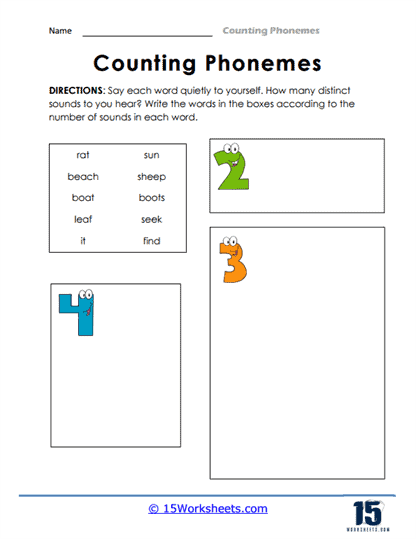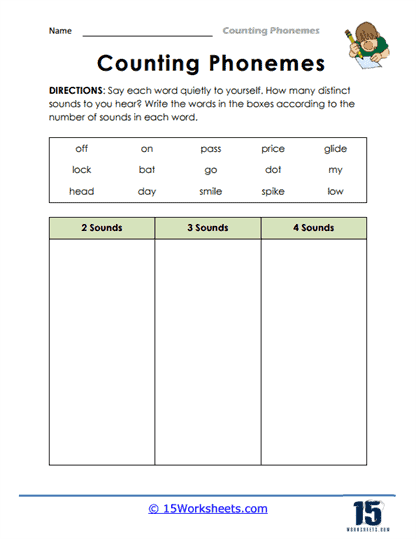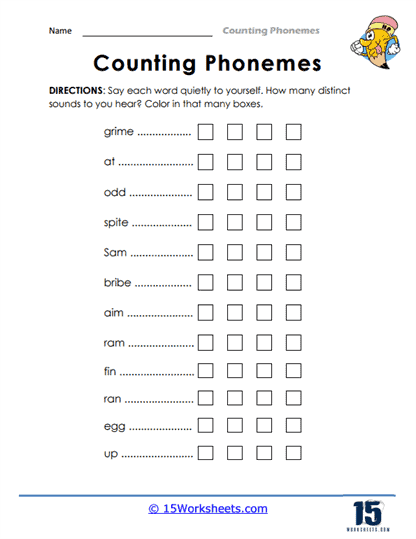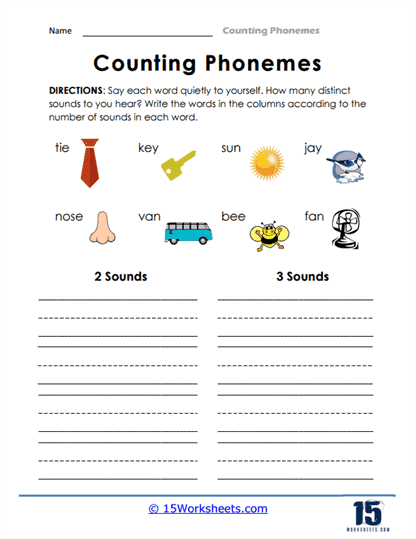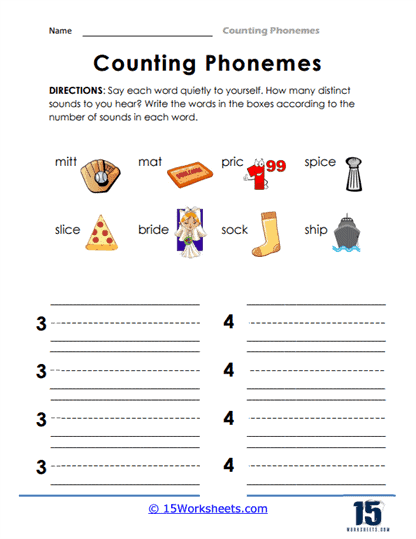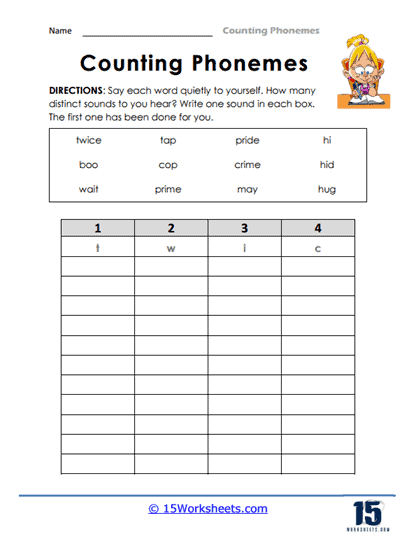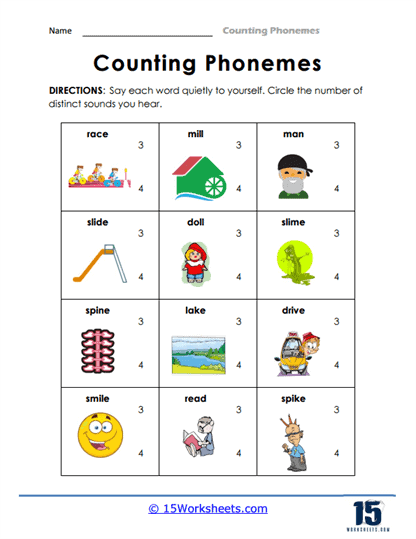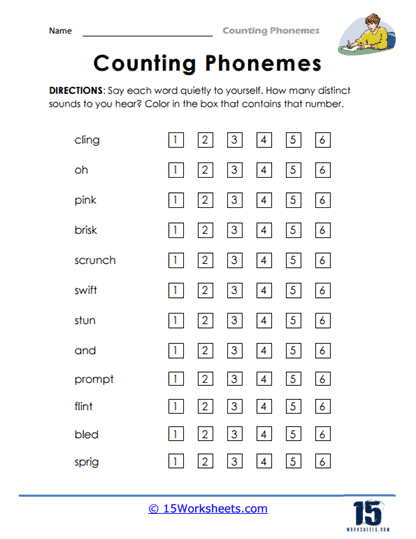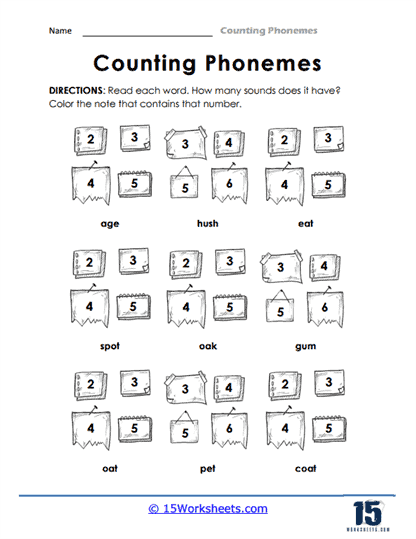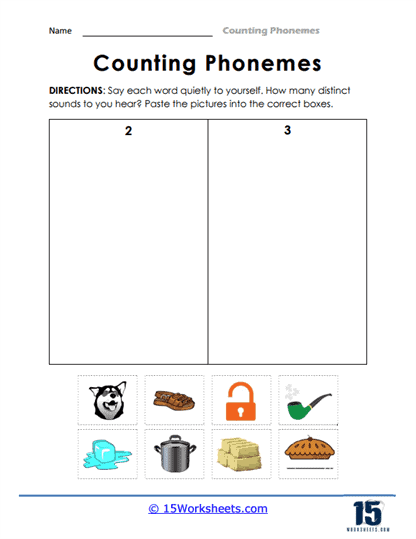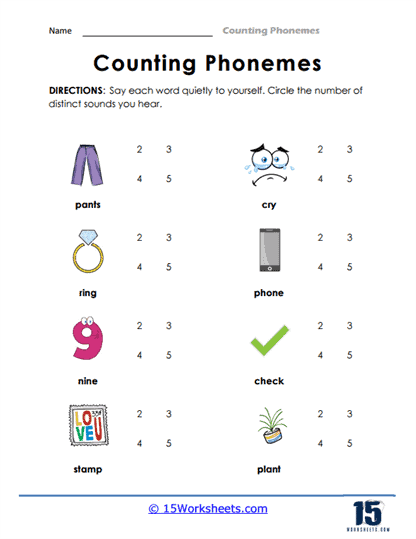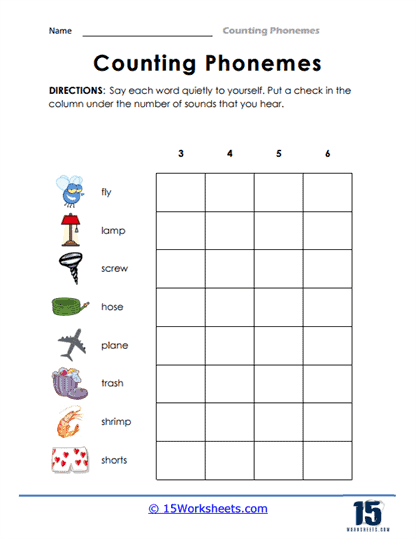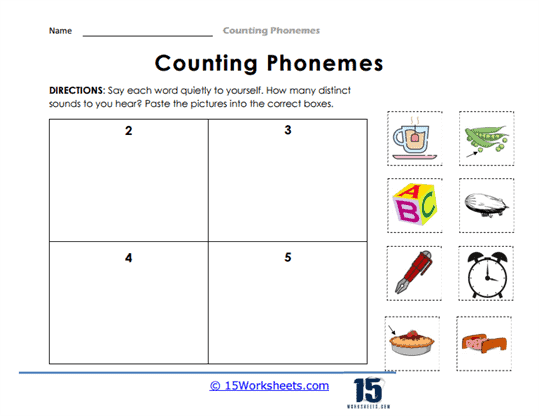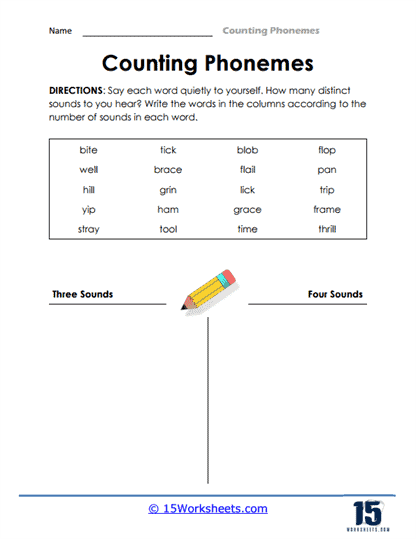Counting Phonemes Worksheets
All About These 15 Worksheets
This collection of Counting Phonemes worksheets is an invaluable resource designed to help students develop a strong foundation in phonemic awareness, a fundamental skill in early literacy.
These worksheets are thoughtfully created to immerse students in the world of phonemes, enabling them to understand, practice, and apply this crucial phonetic skill effectively. Phonemic awareness is essential for reading readiness, word decoding, and spelling accuracy, making this resource an invaluable tool for educators and young learners.
A Look At Individual Worksheets
Welcome to the whimsical world of Counting Phonemes, where young scholars transform into linguistic detectives, diving deep into the mysterious sounds of spoken language. With worksheets like Sorting Them Out and Count And Categorize, students embark on a thrilling auditory safari, hunting for the elusive phonemes hiding in everyday words. It’s like a game of hide and seek-only instead of your cousin hiding behind the couch, it’s the /ch/ sound lurking at the start of “cheese.” As they sort and categorize words by their phoneme count, young learners unknowingly become phoneme connoisseurs, capable of dissecting a word’s sonic DNA like sound surgeons in scrubs made of construction paper.
In Counting With Colors and Coloring Quest, the phoneme adventure gets a splash of rainbow magic. Who knew language analysis could involve crayons? With each colored syllable and shaded sound, students turn into artistic audiologists-Picassos of phonological awareness. Meanwhile, Two Or Three throws them into an ethical dilemma: does this word have two sounds or three? It’s practically a philosophical debate-one that would make Plato say, “I heard that!” And then Picture-Perfect Clues swoops in to challenge students with adorable illustrations masking sneaky sounds, prompting them to say, “That cat might be cute, but how many phonemes is it hiding?”
For those who enjoy puzzles and logic, Sound Boxes and Phonemic Playground are like linguistic escape rooms. Students must crack the phonemic code, sliding sounds into boxes like little word-shaped Tetris pieces. In Phonemic Playground, they even get recess while learning (metaphorically speaking)-it’s a sandbox of syllables where the monkey bars are made of /s/ sounds and the swings hum with /oo/. Then comes Rainbow Notes, where musicality meets phonology, allowing students to “hear” the rainbow, organizing sounds in a way that would make even Mozart tap his foot to a CVC beat.
Some worksheets offer a bit of crafts-and-cuts chaos: enter Cut And Paste, the kindergarten version of molecular biology, where sounds are spliced and rearranged with safety scissors. In Out Of Four Choices, students become game show contestants, eliminating phoneme imposters like pros: “I’ll take ‘Short Words with Three Sounds’ for 300, Alex.” Sounds In Sight and Image Sort make visual learners feel like phoneme private eyes, peering through magnifying glasses at sneaky vowel combinations hiding in plain sight.
We arrive at Number-Word Match and Word Box Challenge, the grand finales where students face their phonemic Everest. They match the number of sounds to words, teetering on the edge of intellectual greatness, and then dive into the Word Box Challenge, a task so intense it makes even adults say, “Wait… does ‘shrimp’ have five phonemes?” (It does. And now your brain itches.) These worksheets push phoneme warriors to the edge of their sound-sorting capabilities, but they rise, victorious, armed with knowledge and glue sticks.
What Are Phonemes?
Phonemes are the smallest units of sound in a language that can distinguish meaning. They are the building blocks of spoken language and serve as the basis for constructing words, phrases, and sentences. Phonemes are abstract representations of speech sounds and do not have meaning on their own, but when combined in various ways, they create words with specific meanings.
In English, there are approximately 44 phonemes, which include both consonant and vowel sounds. The exact number of phonemes can vary slightly depending on the dialect or accent of a speaker. It is important to note that the number of phonemes in a language does not always correspond to the number of letters in the alphabet, as some letters or letter combinations can represent different phonemes, and some phonemes can be represented by multiple letters or letter combinations.
Phonemic awareness, or the ability to identify, isolate, and manipulate phonemes in spoken words, is a crucial aspect of language development and literacy skills. Developing phonemic awareness helps learners understand the sound structure of words, which in turn improves their reading, writing, and pronunciation abilities.
How to Count Phonemes
Counting phonemes in a word involves identifying the individual sounds that make up the word, regardless of the number of letters used to represent each sound. Here’s a step-by-step guide to counting phonemes:
Speak the Word Slowly and Clearly – Pronounce the word at a slower pace than usual to better hear and identify the individual sounds.
Break the word into its Distinct Sounds – Focus on the individual sounds that make up the word, not the number of letters used to spell it. Remember that some phonemes are represented by single letters, while others are represented by letter combinations.
Count the Sounds – Keep track of the number of individual sounds in the word. Do not count the letters, as the number of phonemes may differ from the number of letters in the word.
By practicing counting phonemes, you can improve your phonemic awareness, which is crucial for developing reading, writing, and pronunciation skills.
The Importance of Counting Phonemes
Learning to count phonemes, or the distinct units of sound in a language that distinguish one word from another, is a fundamental skill in the development of reading abilities for several reasons. Understanding this process in detail illuminates the crucial role phonemic awareness plays in literacy. Here’s a detailed breakdown of why learning to count phonemes is vital for developing reading skills:
1. Foundation of Phonemic Awareness
Phonemic awareness is the ability to hear, identify, and manipulate phonemes. It is a subset of phonological awareness, which also includes working with larger units of sound such as syllables and rhymes. Counting phonemes helps children develop phonemic awareness, a critical early literacy skill, by making them conscious of the individual sounds within words, beyond just their meaning or the letters that represent these sounds.
2. Building Blocks for Decoding
Decoding is the process by which readers apply their knowledge of letter-sound relationships, including knowledge of letter patterns, to correctly pronounce written words. Understanding and manipulating phonemes (through skills such as counting, blending, and segmenting phonemes) is crucial for decoding because it allows children to break down words into their constituent sounds and blend them to form recognizable words. This skill is especially important for reading unfamiliar words.
3. Facilitates Spelling and Writing
Learning to count phonemes not only aids in reading but also in spelling and writing. By understanding that words are made up of distinct sounds, children can begin to spell words phonetically, mapping the sounds they hear to the corresponding letters. This phonemic awareness is critical for developing accurate spelling habits and for the creative spelling often seen in early writing attempts.
4. Supports Vocabulary Development and Comprehension
Phonemic awareness, developed through practices like counting phonemes, contributes to vocabulary development and comprehension. By breaking down words into their phonemic components, children can more easily recognize and learn new words, enhancing their vocabulary. This recognition also aids in comprehending text, as children can focus on the meaning of words and sentences rather than struggling to decode individual words.
5. Critical for English Language Learners
For children learning English as a second language, phonemic awareness is particularly important. English may have phonemes that do not exist in the learner’s native language, making it crucial to practice phonemic skills such as counting phonemes to improve pronunciation and understanding of English words.
6. Predicts Reading Success
Research has consistently shown that phonemic awareness is a strong predictor of reading success in the early grades. Children who enter school with strong phonemic awareness skills typically have an easier time learning to read compared to their peers with less awareness.
7. Intervention and Support
For students who struggle with reading, explicit instruction in phonemic awareness, including counting phonemes, can be an effective intervention. Such targeted support can help students overcome reading difficulties by strengthening a foundational skill.
This collection empowers educators to nurture young learners on their journey to becoming confident and proficient readers and communicators.

